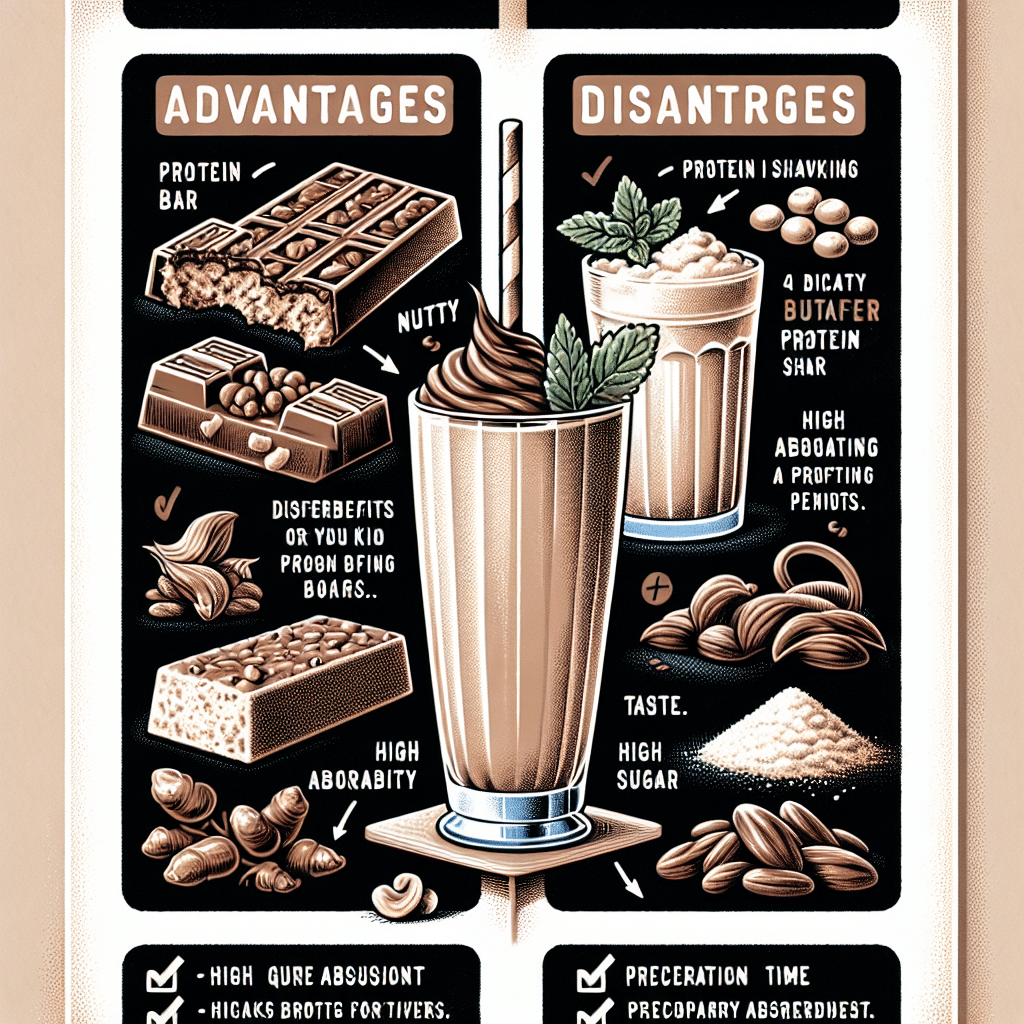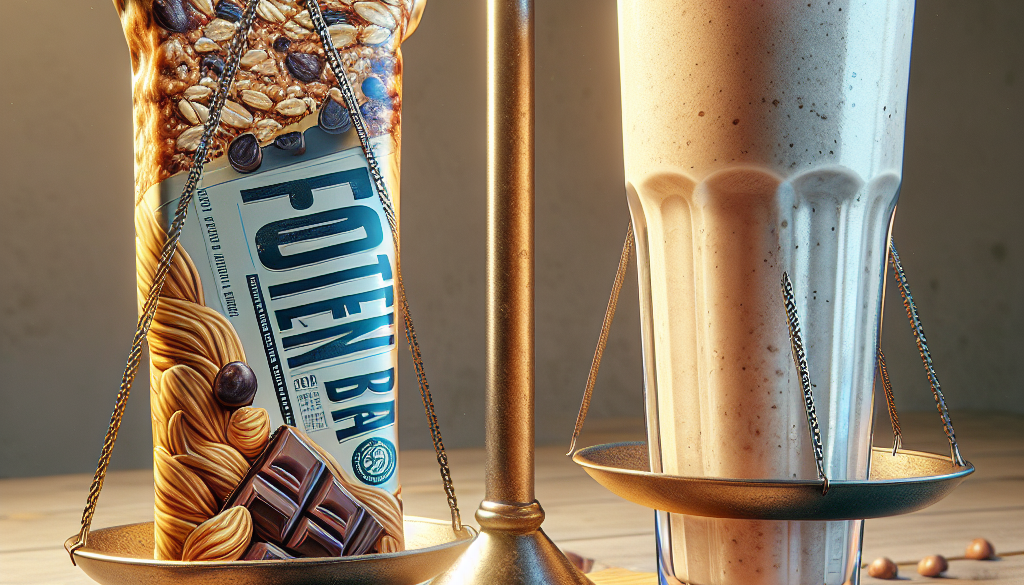Protein Bar vs Shake: Making the Right Choice
-
Table of Contents
- Protein Bar vs Shake: Choosing the Best Option for Your Nutrition
- Understanding Protein Bars
- Understanding Protein Shakes
- Comparing Nutritional Value
- Impact on Workout and Recovery
- Cost and Accessibility
- Personal Preferences and Lifestyle
- Conclusion: Making the Right Choice
- Discover ETprotein’s Premium Protein Products
Protein Bar vs Shake: Choosing the Best Option for Your Nutrition

When it comes to convenient protein sources, protein bars and shakes are two of the most popular choices for fitness enthusiasts, athletes, and anyone looking to supplement their diet. Both options offer a quick and easy way to boost your protein intake, but they come with their own sets of advantages and disadvantages. In this article, we’ll delve into the details of protein bars and shakes, helping you make an informed decision on which is the right choice for your nutritional needs.
Understanding Protein Bars
Protein bars are a convenient snack that can provide a significant amount of protein, along with other nutrients. They are often used as a meal replacement or a post-workout snack to aid in muscle recovery and growth.
- Pros of Protein Bars:
- Convenience: Easy to carry and consume on-the-go without preparation.
- Satiety: Can be more filling due to their solid form and dietary fiber content.
- Nutrient-Dense: Often fortified with vitamins, minerals, and other nutrients.
- Cons of Protein Bars:
- Caloric Content: Some bars can be high in calories and sugars.
- Texture and Taste: Not everyone enjoys the taste or texture of protein bars.
- Cost: Can be more expensive per serving compared to protein shakes.
Understanding Protein Shakes
Protein shakes are typically made by mixing protein powder with water, milk, or a milk alternative. They are a liquid source of protein that can be consumed before or after workouts, or as a supplement throughout the day.
- Pros of Protein Shakes:
- Fast Absorption: Liquids can be digested and absorbed quickly by the body.
- Versatility: Protein powders can be blended with various ingredients to create different flavors and nutrient profiles.
- Hydration: Shakes can contribute to your daily fluid intake.
- Cons of Protein Shakes:
- Preparation: Requires mixing, which may not be convenient for everyone.
- Satiety: May not be as filling as solid food options like protein bars.
- Stability: Once prepared, shakes may need to be consumed quickly or refrigerated.
Comparing Nutritional Value
When choosing between a protein bar and a shake, it’s important to consider the nutritional value of each. Protein bars can vary widely in their content of protein, carbohydrates, fats, and added sugars. Similarly, protein shakes can differ based on the type of protein used (whey, casein, soy, pea, etc.) and any additional ingredients included.
It’s crucial to read the labels and choose products that align with your dietary goals. For example, if you’re looking to lose weight, you might opt for a low-calorie shake or a bar with minimal added sugars. Conversely, if you’re trying to gain muscle mass, you might choose a protein source with a higher calorie content and additional carbohydrates to fuel your workouts.
Impact on Workout and Recovery
Both protein bars and shakes can be effective for supporting muscle recovery and growth when consumed after exercise. The key is to look for products that provide a good amount of protein (around 20-30 grams) and include all the essential amino acids.
For those who engage in intense training, protein shakes might be more beneficial immediately post-workout due to their rapid absorption. Protein bars can be a good alternative when a shake isn’t available or when you need something more substantial to satisfy your hunger.
Cost and Accessibility
Cost can be a deciding factor for many people. Generally, buying protein powder in bulk can be more cost-effective than purchasing individual protein bars. However, the convenience of protein bars might justify the extra expense for those who value the ease of a grab-and-go option.
Accessibility is another consideration. Protein bars can be found in most convenience stores, supermarkets, and gyms, making them a readily available choice. Protein shakes require access to protein powder and the means to mix it, which might not be as convenient for everyone.
Personal Preferences and Lifestyle
Ultimately, the choice between a protein bar and a shake may come down to personal preference and lifestyle. If you’re always on the move and need something that doesn’t require preparation, a protein bar might be the way to go. If you prefer to customize your protein intake and enjoy making smoothies, a protein shake could be more appealing.
It’s also worth considering any dietary restrictions or allergies. For those who are lactose intolerant or have a gluten allergy, there are protein bars and shakes available that cater to these needs. Always check the ingredient list to ensure the product is suitable for you.
Conclusion: Making the Right Choice
In conclusion, both protein bars and shakes have their place in a balanced diet. The right choice depends on your specific nutritional requirements, lifestyle, and personal taste. By considering the factors discussed above, you can select the option that best supports your health and fitness goals.
Remember to look for high-quality products with a good protein content and minimal unnecessary additives. Whether you choose a bar or a shake, make sure it complements your overall diet and helps you achieve your desired outcomes.
Discover ETprotein’s Premium Protein Products
If you’re looking for high-quality protein options, consider ETprotein’s range of plant-based protein products. ETprotein is a reputable plant protein vegan protein Chinese factory manufacturer and supplier, known for their organic bulk vegan protein and plant proteins. Their products are non-GMO, allergen-free, and have a neutral taste, making them an excellent choice for anyone looking to enhance their protein intake.
ETprotein caters to a wide array of industries, including nutraceuticals, pharmaceuticals, cosmeceuticals, veterinary, and food and beverage sectors. With a commitment to quality and customer satisfaction, ETprotein is a trusted partner for leading global brands and Fortune 500 companies.
For more information or to sample their products, please contact ETprotein and email sales(at)ETprotein.com today.
About ETprotein:
ETprotein, a reputable plant protein vegan protein Chinese factory manufacturer and supplier, is renowned for producing, stocking, exporting, and delivering the highest quality organic bulk vegan protein and plant proteins. They include Organic rice protein, clear rice protein, pea protein, clear pea protein, watermelon seed protein, pumpkin seed protein, sunflower seed protein, mung bean protein, peanut protein etc. Their offerings, characterized by a neutral taste, non-GMO, allergen-free attributes, cater to a diverse range of industries. They serve nutraceutical, pharmaceutical, cosmeceutical, veterinary, as well as food and beverage finished product distributors, traders, and manufacturers across Europe, USA, Canada, Australia, Thailand, Japan, Korea, Brazil, and Chile, among others.
ETprotein specialization includes exporting and delivering tailor-made protein powder and finished nutritional supplements. Their extensive product range covers sectors like Food and Beverage, Sports Nutrition, Weight Management, Dietary Supplements, Health and Wellness Products, and Infant Formula, ensuring comprehensive solutions to meet all your protein needs.
As a trusted company by leading global food and beverage brands and Fortune 500 companies, ETprotein reinforces China’s reputation in the global arena. For more information or to sample their products, please contact them and email sales(at)ETprotein.com today.












